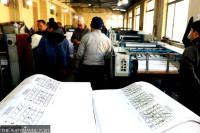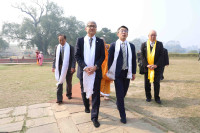National
Government pushes to free universities from political grip
Bill in the works to bar the prime minister from becoming the university chancellor and restore academic autonomy.
Binod Ghimire
Rampant politicisation continues to erode Nepal’s universities, with critics blaming the provision that makes the prime minister their chancellor.
Despite repeated warnings from education experts, the problem has largely been ignored by those in power. The incumbent non-political government, however, is working to end the decades long practice where the country’s executive holds the university’s top position.
Talking to journalists after the Tribhuvan University’s Senate meeting on Wednesday, Minister for Education, Science and Technology Mahabir Pun said the government is committed to replacing the prime minister with an academic as the chancellor. “Removing the prime minister as chancellor is our top priority. We have decided to use all our strength to ensure this before we leave [the government],” he said.
The incumbent Sushila Karki government is currently working on a higher education bill which will have a provision to replace the prime minister with the academics as the university chancellor. “Discussions are ongoing whether to introduce the law as an ordinance or through other means. But it will be done,” he added.
Since taking charge of the ministry, Pun has been reiterating that the removal of the prime minister as chancellor of the universities is the first step towards improving the academic environment. The education ministry has formed a panel led by Devraj Adhikari, chairperson of the University Grants Commission, to draft a bill.
Presenting her views at the TU Senate, Karki remarked that she is not even aware of the exact number of universities where she holds the post of chancellor. “A prime minister cannot have so many responsibilities. Academics should hold such positions,” she said. “Having the prime minister as chancellor also compromises the university’s autonomy.”
Except for the Madan Bhandari University of Science and Technology and the University of Nepal, all other universities in the country have the prime minister as chancellor and the education minister as pro-chancellor.
There are a total of 19 universities in Nepal.
The vice-chancellor, who is an executive head of the university, is appointed by the prime minister on the recommendation of a three-member committee led by the education minister.
As a result, appointments to executive positions in universities have been heavily politicised, which observers blame for the erosion of academic standards. Over the years, three major parties—the Nepali Congress, the CPN-UML and the now disbanded CPN (Maoist Centre)—have been placing their sympathisers in crucial university positions.
A High-level Education Commission formed by the government in 2o19 had also recommended removing the prime minister from the position of chancellor. Despite public commitments, successive governments made no effort to implement the report.
After pressure from different quarters, a higher education bill prepared by the then Pushpa Kamal Dahal government in early 2024 had proposed removing the prime minister as chancellor. However, it envisioned transferring the role to the education minister. The bill was criticised for contradicting the established principle that universities must be autonomous.
Experts have called for having a board of trustees as the supreme entity of any university. Such a board should have the authority to develop the academic, managerial and other essential policies. Under the board should be academic and executive councils to oversee academic and administrative matters.
As happens in renowned universities around the world, the board of trustees should be given the authority to appoint the chancellor and vice-chancellor, among other important officials, they say. According to educationists, removing the prime minister from the chancellor position represents a major step towards curbing the politicisation of university education.
“This action is overdue, but previous governments lacked the will to implement it,” said Tribhuvan University professor Binay Kusiyait. “If this government succeeds in ensuring that academics replace the prime minister as chancellor, it will leave a remarkable footprint on the education sector.”




 15.12°C Kathmandu
15.12°C Kathmandu















